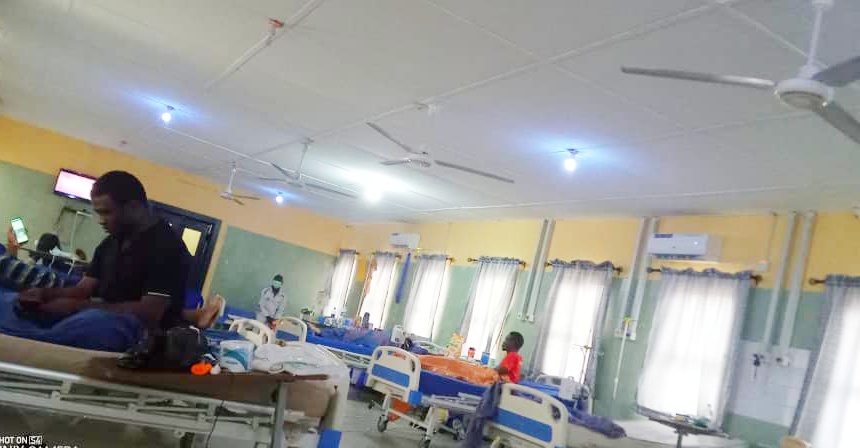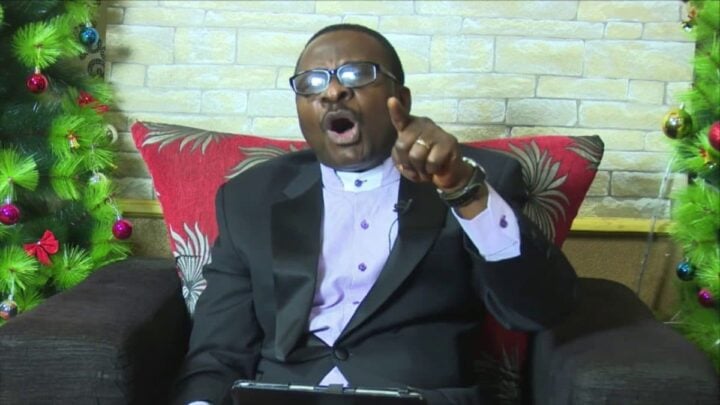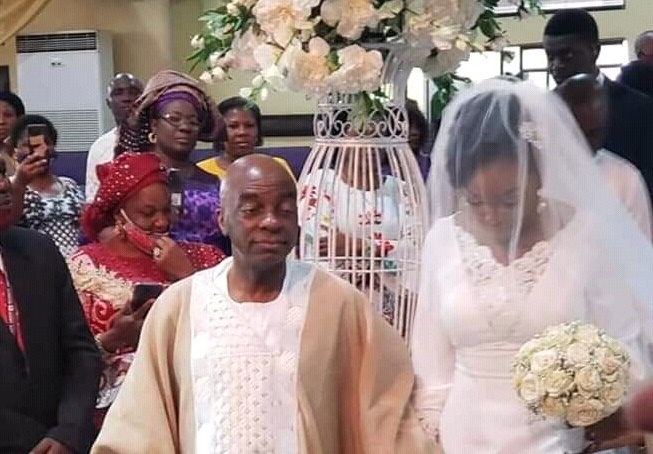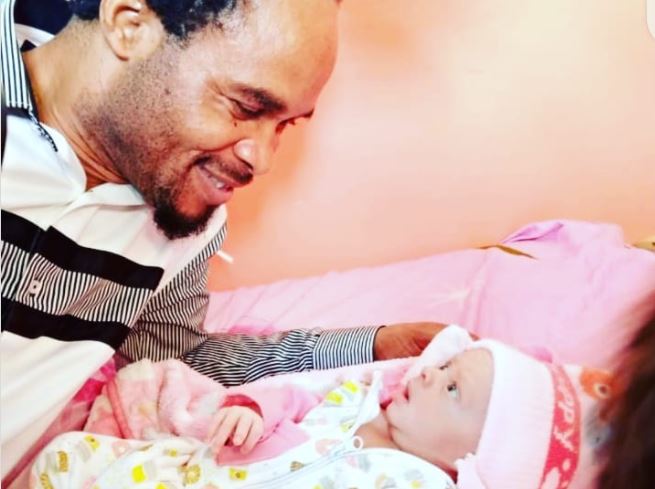BY EJIRO UMUKORO
“Hello”, he says. But his voice was raspy, his breathing laboured.
Theophilus Onojeghen, a notable journalist in Delta, constantly on the move as part of his work. When the lockdown was declared in the Delta region on April 1, he was among many Nigerians who continued filing reports as he followed the spread of the pandemic in the region.
Onojeghen continued reporting even when moving across the state was made difficult because of the restrictions introduced by the government to stop the spread of the disease. At some point during his interactions with other government officials, colleagues, and visits to the treatment centres, Onojeghen became infected.
Advertisement
“I began to feel down long before the symptoms began to show for about two weeks or so,” he said over the phone.
“I met my family doctor, tests were carried out and I was diagnosed as having malaria. I took the drugs but I still did not feel better. Then I began to experience difficulty in breathing. At first, I thought it was asthma attack because I am asthmatic. So I took my drugs but the difficulty in breathing persisted. At this point, I was now very conscious of what I was doing.”
Before this time, however, Onojeghen explained that a friend called him that he too was suffering similar symptoms and that he was waiting for the result of his COVID-19 test. Coincidentally, Charles Ebie, secretary to the Delta state government, and Charles Aniagwu commissioner for information, both announced that they had tested positive for COVID-19.
Advertisement
A total of 43 information officers and journalists at the Delta state government house press unit as well as some appointed public officers confirmed testing positive for the virus.
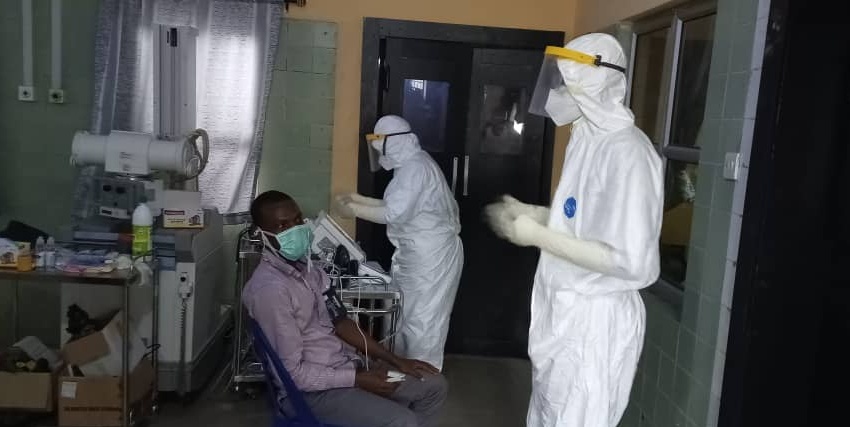
While the most common COVID-19 symptoms include a fever greater than 100.4 degrees, tiredness, body aches, a dry cough, headache, body aches, chills and a loss of taste or smell, serious illness is characterised by one or more of these symptoms accompanied by shortness of breath which could require hospitalisation for supplemental oxygen.
When Onojeghen realised his asthma wasn’t abating, he decided to be proactive and isolated himself in one of the bedrooms in his house staying away from his wife and son.
“It was after my friend called to inform me that he tested positive for COVID-19 that I voluntarily subjected myself for testing at Warri Central Hospital.”
Advertisement
While Onojeghen waited for the results of the test, he said “my breathing became more difficult, I began to feel more body weakness, headaches, cough and I began to stool three to four times a day, which was not normal.”
The index case in Nigeria was recorded on February 27, 2020, while the first case in Delta was recorded on April 7, 2020. Lagos has the highest number of recorded cases in Nigeria, with Cross River and Kogi with the least. While Kogi registered no case on admission, it has two confirmed cases while Cross River has reported one death. As of August 22, 2020, the total number of tests conducted by the Nigeria Centre for Disease Control (NCDC) is 370,000. Despite these numbers, many Nigerians think COVID-19 is a scam used by the government to fleece tax payers.
DIFFERENT PERCEPTIONS ABOUT COVID-19
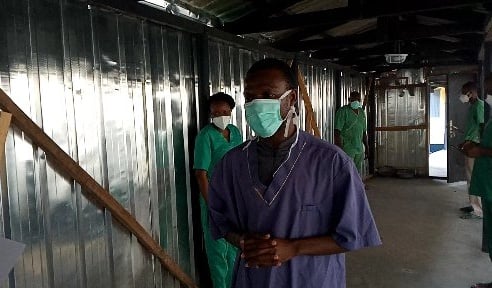
A few persons, however, have come to terms with COVID-19 seeing it as “normal sickness like cold and fever and not a death sentence.” Someone described COVID-19 as “a common cold on steroids, a chimera.” A chimera in biology refers to a single organism that’s made up of cells from two or more “individuals”—that is, it contains two sets of DNA, with the code to make two separate organisms.
Advertisement
Knowledge of the virus ranges from those who do not believe that the virus exists to those who believe that the virus is a death sentence. There are those who accept the virus and take measures to deal with the symptoms like Onojeghen and those like a woman simply identified as Oregbe in the Ughelli area of Delta who collapsed and died when she received the news that her husband had contracted the virus.
As the months pass, many people have become indifferent or are tired of the daily conversation and updates about the disease.
Advertisement
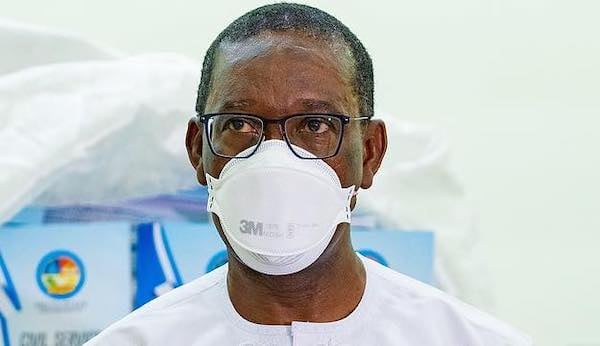
“I have not witnessed it, so I cannot believe there is coronavirus,” is a common refrain from many people. Others still hold on to the belief that the virus is a “foreign disease brought to the world by the white man.” This perception is borne out of the index case, an Italian who visited Nigeria on a business trip on February 27, 2020.
One respondent, in particular, said: “Coronavirus is real, it is everywhere. And just like a normal disease, people who get it can heal from it if it is detected on time.”
Advertisement
Another respondent said “if I see the symptoms, I will take precaution.” Others fear that “this disease will continue to be with us beyond December.” While a large number of persons fall back on their religious conviction saying “it is not my portion to have COVID-19!”
A 57-YEAR-OLD CIVIL SERVANT DIDN’T KNOW HOW HE GOT INFECTED
Advertisement
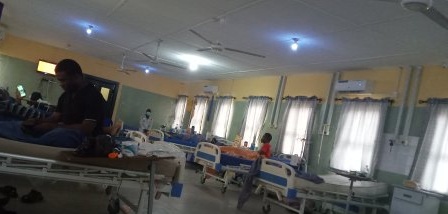
Vincent Ileleji, a civil servant, knows from first hand experience that COVID-19 is real.
“I came into the center last week Monday after my result came positive two weeks ago. Initially, I thought I had malaria. So I went to the clinic and the doctor gave me some drugs. But I didn’t feel better. I was coughing, having headaches, sleepless nights that lead to high Blood Pressure, loss of appetite, and couldn’t even eat. So I complained to my family doctor that I can’t eat. So he recommended a lab test then gave me a series of antibiotic injections. But he also recommended I go for COVID-19 testing. When the result came out, it was positive,” he said.
Sitting on his bed at the Warri Central Hospital treatment centre, Ileleji said he was the 11th person to be admitted with COVID-19 in the male ward. Since then, “six people have been discharged. And in the last three days, another four have joined us. Just yesterday, two more people joined us,” he had said as of July 7, 2020.
EXPERIENCE AT ISOLATION CENTRES
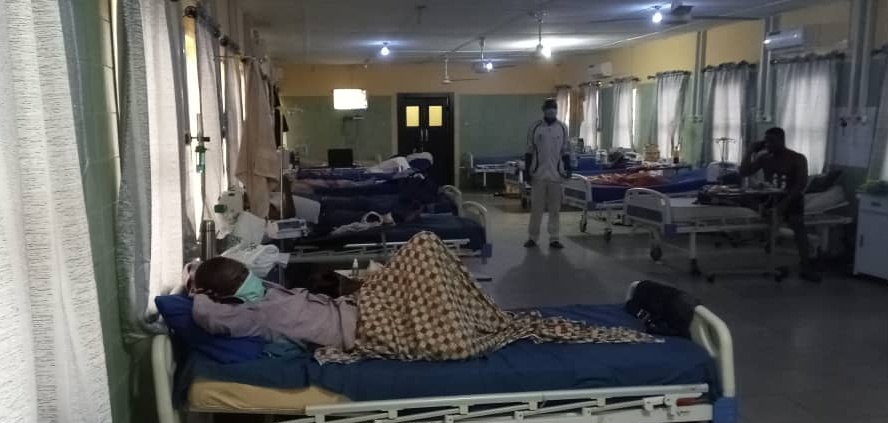
Ileleji and Onojeghen both received treatment at the Warri Central Hospital. In a WhatsApp video call on, they gave a virtual tour of the ward. Onojeghen said: “The center is so clean and habitable! I have never seen any health center or ward as clean as this one. I have never in my life experienced 24-hours light until I got to the treatment center!”
This is how our health centers should always look like. And this is how anybody who is sick, whether with COVID-19 or not, should be treated. Many persons with cancer and kidney problems die because of lack of proper health facilities, committed staff, and lack of equipment.”
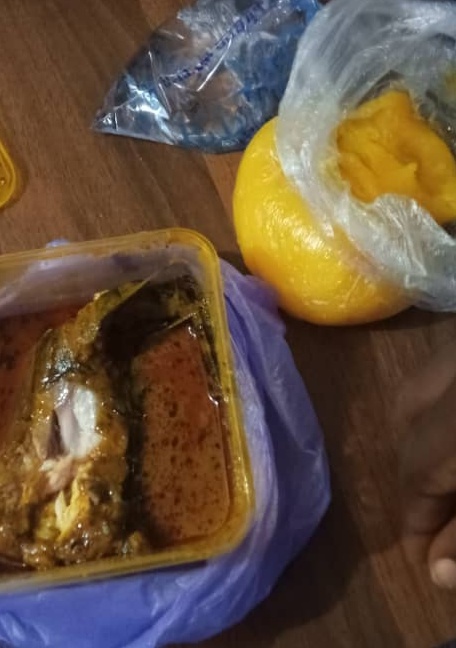
For Ileleji: “The food here is fantastic! We are given three rich square meals a day. Breakfast could be pap and moi moi or fried egg and tea. In the afternoon we eat jollof rice and fried plantain with chicken or pork while dinner could be starch/gari and Banga Soup with fresh fish. We even have 24-hours light and all 6 ACs are working!”
On arrival at the center protocols put in place are strictly adhered to. All incoming patients are disinfected before being admitted and their vital signs are taken. The female ward is separated from the male ward without access to the other.
In the male ward, there are 11-bed spaces. As at the time of this report, only eight persons were receiving treatment in the ward.
At the treatment center, Ileleji said: “All patients are given 10 tablets of Vitamin-C a day; B-Complex: one in the morning and one in the evening to help increase appetite. When I got here I was given 10 capsules of some drugs to flush the virus out of my system.”
Onojeghen said those with underlying ailments got additional drugs.
Although there are four treatment centers set aside for COVID-19 management in Delta, only two are used: the FMC Special Centre in Asaba and the Warri Central Hospital.
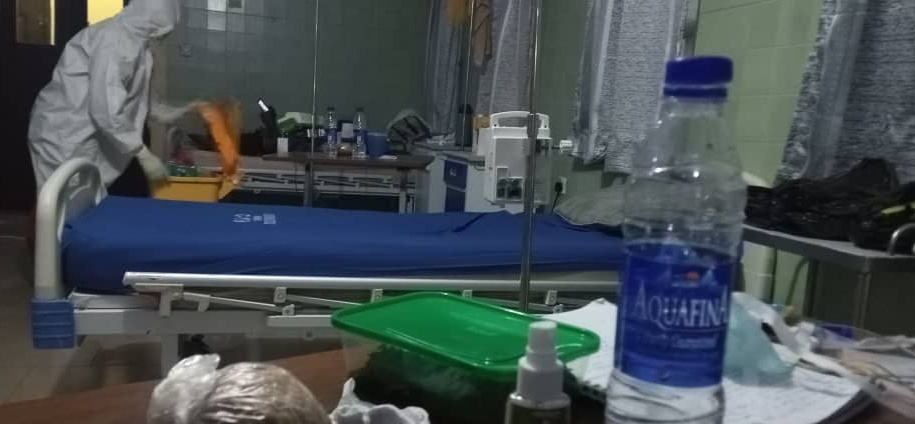
According to Aniagwu, “the Stadium Centre Asaba is managed by the NNPC-Government Partnership with 70 beds and facilities in place and Government-CACOVID partnership with 100 beds and facilities situated at Iseleku, are designed to carter for spill-overs. But they are not currently in use, as we have not experienced any spillovers from the other centres.”
However, some health sources gave a different account entirely.
“Government is cutting down on costs and sending more people home. It is because health workers are overwhelmed, and we don’t have enough staff to kick-off those centers,” one source explained.
Aniagwu, a survivor of COVID-19, was quick to explain. “I had a home care treatment, same as the Governor and his family, the SSG / government staff who experienced mild symptoms. As long as you have facilities to deal with it at home, quarantine yourself and maintain social distance you do not need to have everyone in hospital. Some of the initial cases have migrated to homecare.”
Ifeanyi Okowa, governor of Delta, his wife and daughter all contracted the disease but recovered after weeks of treatment.
In managing the medical needs of a person self-quarantining at home, he said: “Doctors call patients on phone to ensure general care. However, if a person begins to experience shortness of breath, is in need of ventilators, or oxygen, or there is a crisis, an emergency call is put to the doctor at the state hospital and ambulance sent to pick up the person to the isolation center.”
The class of persons he referred to so far receiving such treatments are mostly civil servants or individuals who can afford it. To forestall, manage, and where possible reduce the number of COVID-19 cases, Mordi Ononye, commissioner for health, listed the efforts made by the government.
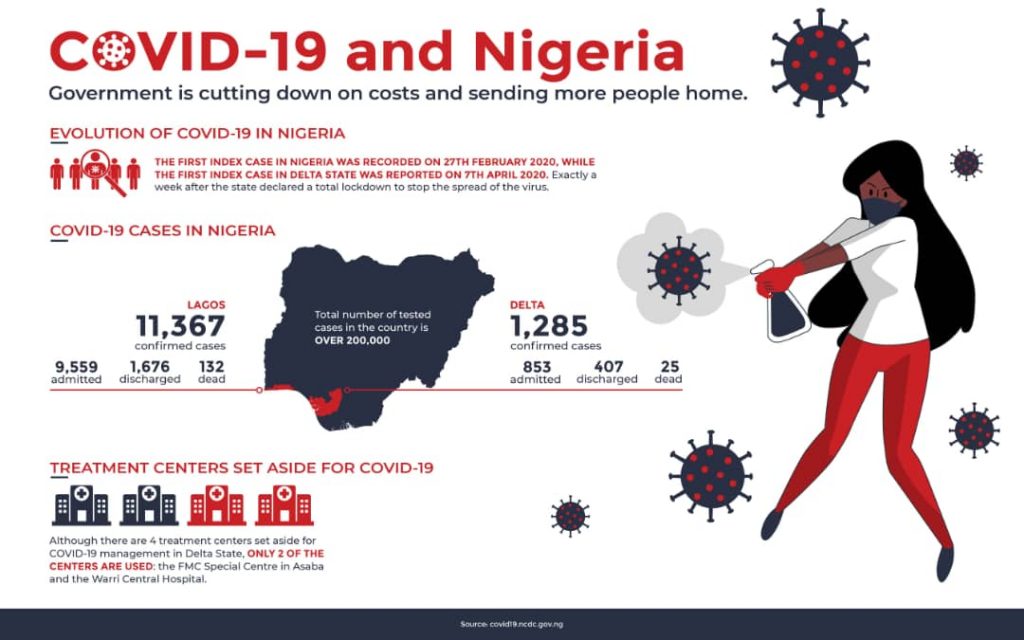
“We are doing a lot in communities opening up sample collection centres in all local government areas every Wednesdays from 8:00am to 2:00pm for people to walk in and get tested even though they may not be showing symptoms,” he said in an interview.
These sample collection centres are located in health centres found in each local government headquarters. They include Delsu, Sapele, Ughelli, Asaba, Koko, Oleh, Warri, Bomadi, Kwale, Agbor, Ogwashi-ukwu.
As of August 22, Delta had a total of 1,696 cases out of which 1,497 have recovered and 56 have died. Onojeghen and Ileleji are among those discharged from the treatment centres.
This report was supported by the Africa Women Journalism Project in partnership with the International Centre for Journalists (ICFJ)
Add a comment
